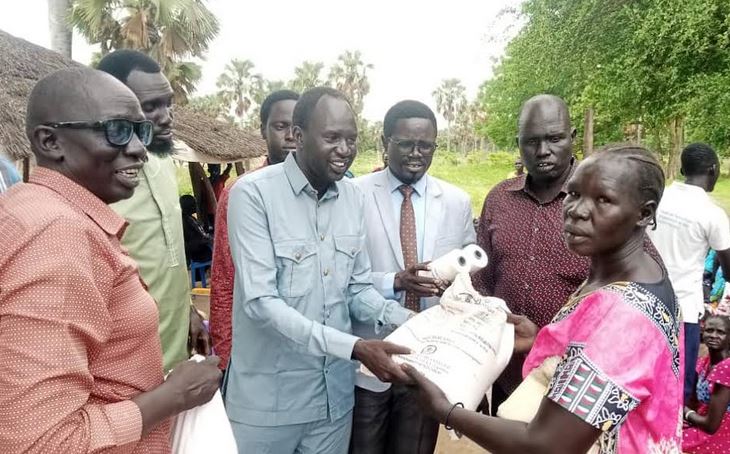The UN Food and Agriculture Organization (UNFAO) in partnership with Lakes State at the weekend launched the distribution of vegetable seeds, maize and sorghum seeds, and fishing kits comprising hooks, monofilaments, and fishing nets to 3,000 households in Rumbek East County.
William Mading, the FAO officer in charge of the distribution of agricultural inputs in Rumbek East County, lauded the state government for facilitating the exercise. He said FAO is implementing resilience projects to alleviate some of the crises in South Sudan.
“Disaster preparedness and response is also a component of this project. We gave out some key messages to the farmers on how best they can thrive should there be floods. We advised them to shift to high ground, taught them how to use the first maturing seeds that are harvested after two and half months so that they will help to close the hunger gap,” he explained. “We distributed seeds of vegetables, onions, okra, and others like crops seeds of sorghum, beans, and maize. We also gave out fishing kits. We have intervened in all counties but we have chosen to directly implement this project in partnership with the government in the four counties of Rumbek East, Rumbek Center, Cueibet, and Wulu.”
Mading stated that Norwegian People’s Aid (NPA) is implementing the project in the counties Awerial, Yirol West, Cueibet, and Yirol East. He said they will coordinate and continue to distribute items to 15,600 households across Lakes State.
The minister of agriculture and forestry in Lakes State, Poth Majak Daljang said they visited farmer groups in Rumbek East County, particularly in the areas of Pacong and Pulkuc and it coincided with the distribution of seeds.
“The distribution of seeds started earlier but we chose to come and share some of their experiences and also give them some technical support such that they increase food production in this year,” he said. “We also informed our farmers about the looming floods so that they are careful when cultivating. They need to shift to higher ground such that they are not affected by the floods.”
Abraham Madit, a beneficiary of the program expressed happiness and thanked FAO for the initiative but said the distribution of some of the seeds was delayed.
“Seeds like maize, sorghum, and beans are suitable for growing early in May and June because when they are planted early, they can be harvested early,” he said.
Another beneficiary, Yom Makoi, who got vegetable, sorghum, maize, and bean seeds and fishing nets and hooks said she would put them to good use.
‘I am very happy to receive these things and I am now taking them to my home and I will use them properly for my livelihood,” she said. “All these things made me to be so happy and I appreciate the organization that distributed them to us.”




